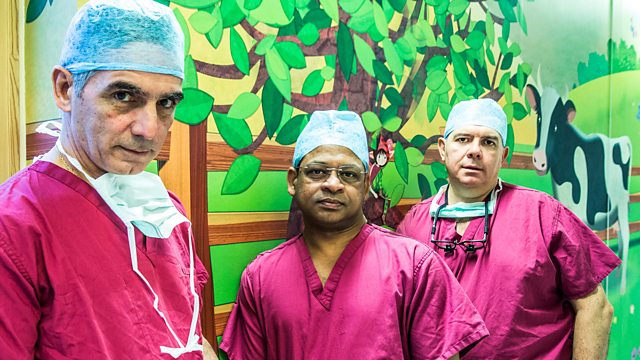
The day-to-day realities facing the NHS. Alder Hey closes its critical care unit to new admissions. A five-year-old returns three times for her cancelled heart operation.
Alder Hey Children's Hospital has a world-class reputation for cutting-edge procedures in treating congenital heart defects. Children from across the north west and Wales are referred to the three heart surgeons who operate in the country's first hybrid theatre, in a paediatric standalone centre, capable of high-tech imaging and surgical procedures at the same time - within different specialities such as heart, brain and spinal surgery. But when the number of seriously ill children increases across Alder Hey, the hospital's status escalates to red - when capacity is at a critical level. Intensive Care is full and has to close to new admissions. There are no free paediatric intensive care beds across the whole of the north west.
Before the cardiac team can go ahead with an operation they must secure an intensive care bed for each of their young patients for when they come out of surgery. Despite aiming to perform four hundred operations a year, there are over 80 children on the cardiac surgeons' waiting list. When the 21-bed intensive care unit is at capacity operations must be cancelled. Staffing pressures mean the Intensive Care coordinator has to take on the responsibility of four team leaders on the unit. When a crash on the motorway between Manchester and Liverpool closes the route to work for many hospital staff, the already stretched clinical teams push on into double shifts.
Scheduled operations are cancelled to make way for the emergencies. The three paediatric cardiac surgeons stand down and wait. For two weeks running this world class team has managed less than half of their scheduled operations.
Casey-Jack is only hours old. He was born with a congenital heart defect, discovered during his mum's 20-week scan. He has a hole in his heart and a damaged main artery. He has arrived at the Alder Hey for an operation to repair his heart, no bigger than a strawberry, as one consultant describes it. But when Casey-Jack suddenly crashes, he is rushed to Intensive Care, taking the one remaining bed. Hence, ICU is full.
Five-year-old Aaima arrives at the hospital for a scheduled third and final heart operation to redirect a vein to improve the blood flow. After her first operation she had a cardiac arrest. She, too, needed an emergency intensive care bed. Her parents have driven 40 miles from Manchester but with Casey-Jack's sudden deterioration, Aaima's reserved post-op ICU bed has been taken and the unit is full. The family must go home, and Aaima is booked in for two days later. When the family return, there is no ICU bed again. Aaima will have to come back for a third time as the Alder Hey team work to ensure that this time a bed will be free.
Three-month-old Edith urgently needs surgery, as she only has half a functioning heart. Her lungs can't get the oxygen they need from her undeveloped arteries. She is on a machine supporting both organs. Edith hasn't taken an unassisted breath for almost a month. Even for these specialists this is not a routine operation as they try to widen and scaffold the narrow arteries. They will completely stop Edith's tiny heart to reduce the risk of a fatal bleed. There is a 15 to 20 per cent risk that she may not survive but this 11-hour operation is the only chance she has.
Hospital is a co-production with the Open University.
Last on
Credits
| Role | Contributor |
|---|---|
| Executive Producer | Lorraine Charker Phillips |
| Executive Producer | Simon Dickson |
| Executive Producer | Jackie Waldock |
| Series Producer | Meghan Just-Truelove |
| Series Producer | Gayl Paterson |
| Series Editor | Sunshine Jackson |
| Production Company | Label 1 |
Explore extensive resources and information on healthcare and nursing with The Open University
Visit the Open University website.
